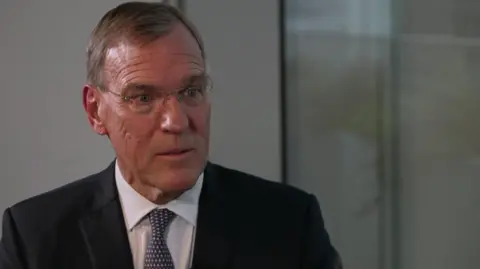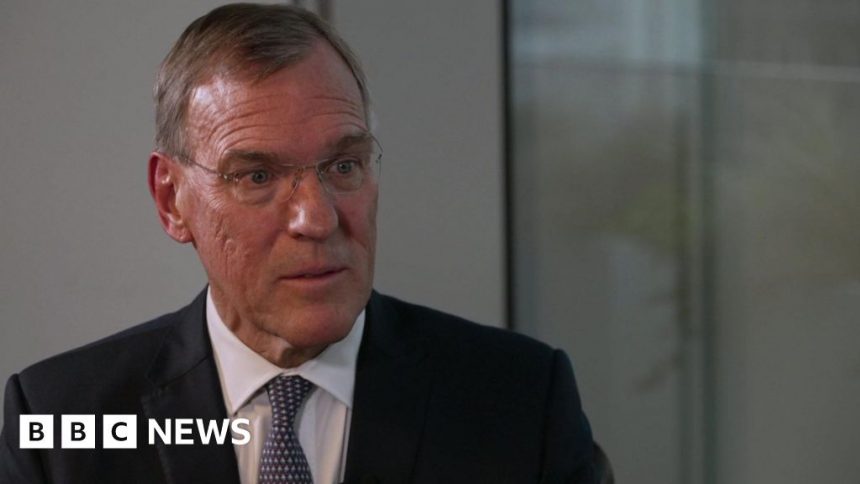Goldman axes diversity rule that has ‘served purpose’
 BBC
BBCGoldman Sachs’ international boss has said the bank ditched an internal diversity rule that barred it from advising all male, all white boards on company flotations because it was no longer needed.
The investment bank had pledged that it would only help a business sell its shares on a stock exchange if it had two diverse board members, one of which had to be a woman.
But Richard Gnodde told the BBC: “That policy was put in place to try and drive a change in behaviour and I think that’s happened.”
In a wide-ranging interview, he also said the UK government needed to get on and start infrastructure projects now and warned that uncertainty over US policy was dampening firms’ “animal spirit”.
Goldman Sachs introduced its diversity policy on boards in 2020, initially mandating that companies who wanted to float had to have one diverse member, before increasing it to two people.
Mr Gnodde said: “I think what is important is that you have a diversity of views on that board and if you look at these companies they’ve all embraced diversity, it’s moved along.
“This was a policy from a decade or so ago, I think it has served its purpose.”
Last December, a US federal appeals court ruled that Nasdaq, the stock market index, could not impose rules requiring companies to have women and minorities on their boards or explain why they did not.
A spokesperson for Goldman Sachs said: “As a result of legal developments related to board diversity requirements, we ended our formal board diversity policy.”
In one of his first acts after being sworn in, US President Donald Trump signed an executive order to end “radical and wasteful government DEI [diversity, equity, and inclusion ] programs”.
A number of companies have since rowed back on diverse hiring programs, including Google and Meta, the firm that owns Instagram and Facebook.
Asked whether firms were stepping back from policies around diversity because of the Trump White House, Mr Gnodde said: “I can only speak for ourselves, I don’t think that’s the case.
“Our ambitions are to continue to take things forward and frankly to go much further than we have been.”
‘Animal spirits’
However, he conceded that uncertainty caused by Trump’s policy on trade tariffs was weighing on companies’ “animal spirits” and their appetite for investment.
“I think right now, the mood is on the margin [is] a little tempered, because people are uncertain about exactly what the policy outcome will be and exactly what the impacts will be,” said Mr Gnodde.
Trump initially said he would impose 25% tariffs on Canada, Mexico and China. However, he then paused them against Canada and Mexico for 30 days.
Since then, the president has subsequently announced he would impose 25% tariffs on all steel and aluminium entering the US, provoking furious responses from the likes of Canada and the European Union.
Start building
Looking at the UK, Mr Gnodde urged the government to get going on infrastructure projects sooner rather than later.
Chancellor Rachel Reeves recently announced her backing for a third runway at Heathrow as well as expanding Luton and Gatwick airports, and building a “growth corridor” between Oxford and Cambridge.
However, these projects are not expected to be completed for a number of years.
The government has made growing the economy a key policy but UK growth has slowed, according to official figures.
Mr Gnodde said: “The long range projects are very interesting. We need to put them in place but they’re going to take a long time.”
He added: “Let’s find some infrastructure builds that we need to do, whether it’s in the energy sector, whether it’s in transportation, improving the road network, something on energy transition.
“These plans all sit on the Treasury’s desk. Why don’t we put them out to tender, get the private sector to bid on terms that will be attractive to the private sector, and you will see competition.”
In a report into boosting small businesses in Britain, released on Wednesday, Goldman Sachs said: “If there are two things we know from the first six months of a new administration in the UK, it is that growth is the pressing national mission and unlocking it is perhaps the greatest challenge that consecutive governments have faced.”
Mr Gnodde said Labour had “sent a strong message on the competition front” after it recently ousted the chair of the Competition and Markets Authority.
He added that the government pulling such a lever could ignite growth to make the UK “globally competitive”.
He also suggested that UK businesses had to consolidate to compete globally.
“How many of these players do we need?”, he said. “How many telcos do we need? How many banks do we need? I think the market should be able to drive that if we’re going to compete on the global stage.”







